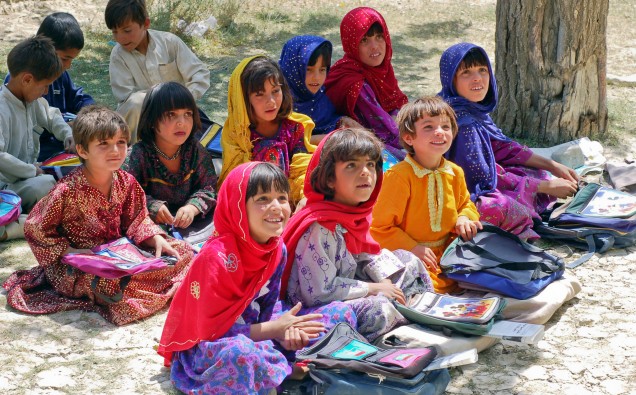
Taliban groups may hold direct talks with the Afghan government by the end of February to find a way to bring an end to the bloody conflict that showed no signs of let up in recent months and has prompted calls for the United States to make a long-term commitment to consolidate gains.
A joint statement issued after a meeting of the Quadrilateral Coordination Group (QCG) of Afghanistan, Pakistan, the United States and China said the group adopted a roadmap “stipulating the stages and steps in the process”.
While the group “expected” the direct talks later this month and called for all Taliban groups to join the peace talks, it did not give any details if militants had been approached for what would be a re-start of a stalled dialogue that began July last year.
“The Group stressed that the outcome of the reconciliation process should be a political settlement that results in the cessation of violence, and durable peace in Afghanistan,” according to the statement.
In early July 2015, Pakistan hosted a meeting between Afghan government officials and Taliban representatives to discuss reconciliation, but the announcement of militants’ long-time leader Mullah Omar’s death in 2013 skirted the subsequent round of talks.
After an intense military engagement in Afghanistan since the aftermath of the 9/11 attacks that emanated from that country, the United States is now pushing for an Afghan-led reconciliation process to end the violence that will pave the way for a complete withdrawal of American forces.
As part of the exit strategy, the United States and NATO ended their combat role in January last year, replacing Operation Enduring Freedom with the Resolute Support Mission, restricting their role to train, advise and assist and conducting counter-terrorism operation and giving the combat role to the newly trained Afghan army. The plan was to pull out completely by the end-2015.
But escalation in violence in the second half of 2015 forced a review of a decision of a total withdrawal by President Obama who announced on Oct. 15 to keep thousands of troops in Afghanistan through the end of his term in 2017.
Mullah Akhtar Mansour who replaced Omar now heads the strongest group within an array of militant factions, many of whom have joined hands with other terrorist networks operating in the region, notably the Afghan chapter of the ISIL which is trying to exert its authority in parts of the warn-torn country.
General John Campbell, the outgoing commander of the U.S. forces in Afghanistan now believes his country might need a more “sustained attention” than a presence of mere a planned 5,500 troops beyond 2016 after an “uneven” performance by the Afghan national army last year.
“Afghan security forces have not consolidated significant gains of their own, nor defeating the insurgency across the Afghanistan, “he said at a congressional hearing this week.
“Suffice it to say, their performance this year was uneven ….. Ultimately, Afghanistan has not achieved an enduring level of security and stability that justifies reduction in our support in 2016.”
The General warned if the U.S. did not make deliberate, measured adjustment, “2016 is at risk of being no better, and possibly worse, than 2015.” He even did not discount the possibility of increasing the number of troops next year to defeat militant groups including Taliban, the Haqqani Network, al-Qaeda and Daesh, or Islamic State-Khorasan Province (IS-KP).
Despite notable gains, Afghan shortfalls are feared to persist in 2016 and, for Gen. Campbell, at least 70% of the problems facing the Afghan Security forces result from poor leadership. That simply means more space and aggression from militant groups.
Unlike previous years, in 2015, Taliban extended the fighting season to almost the entire year, and Daesh continues to conduct brutal attacks with their efforts focused on Nangarhar province near the border with Pakistan. Groups aligned with the Taliban such as al Qaeda and the Haqqani Network continue to threaten the U.S. national security interests.
“These are certainly not “residual threats” that would allow for peaceful transition across Afghanistan. Instead, they are persistent threats that are adapting to a changing operational environment,” Gen. Campbell observed. “Ultimately, the threats Afghanistan faces require our sustained attention and forward presence.”
Since 2001, the U.S. has lost over 2,200 servicemen and women and over 20,000 wounded. The United Nations Assistant Mission in Afghanistan (UNAMA) documented 1,592 civilian deaths and 3,329 injured as a result of suicide and other militant attacks in the first six months of the 2015 alone.
Currently, there are about 13,000 troops – both American as well as NATO – supporting the RSM, with U.S. forces accounting for the biggest chunk.
While Gen. Campbell seeks a “long-term” U.S. commitment to stave off threats of attacks on the West and on the homeland from militants based in Afghanistan, he believes reconciliation is the path needed to obtain a negotiated settlement and end the conflict in Afghanistan.
The Quadrilateral group agreed to continue regular meeting to set a date for the direct talks and to ensure a smooth way forward in the peace and reconciliation process in Afghanistan. The group will next meet in Kabul on Feb. 23.












